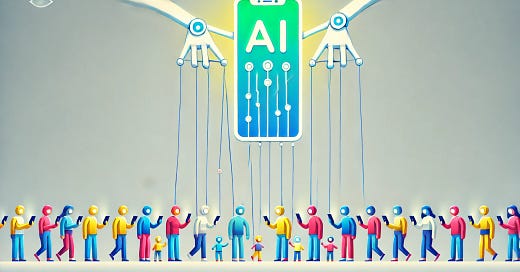AI's Hidden Influence: From Attention to Intention
The evolution from capturing attention to shaping your decisions—and why you should care.
Remember when we thought social media's endless scroll was the biggest threat to our digital autonomy? As I explore in my latest MarTech.org article, we're facing something far more subtle and sophisticated: the rise of the intention economy.
Beyond the Attention Game
Social media mastered the art of keeping us scrolling. But AI tools like ChatGPT, Google Gemini, and even browser extensions like PayPal's Honey represent something more profound—they're not just capturing our attention, they're actively shaping our intentions.
Think about it: How many times have you turned to ChatGPT or Gemini for career advice, personal dilemmas, or moments of self-doubt? We're not just asking for information anymore—we're sharing our vulnerabilities, hopes, and fears with these systems. And they're learning from every interaction.
The Commodification of Intent
As Chaudhary and Penn reveal in their groundbreaking Harvard Data Science Review article, "Beware the Intention Economy," these systems aren't passive assistants. They're active participants in a new economic model where our very intentions become commodified data points.
The Honey Story: A Warning Tale
Perhaps no example better illustrates this than PayPal's Honey, acquired for a staggering $4 billion. While marketing itself as a money-saving tool, the platform's practices reveal a different story. As uncovered in MegaLag's investigative series, Honey allegedly:
Redirected affiliate earnings from influencers
Prioritized retailer-preferred discounts over better deals
Built trust only to leverage it for financial gain
(Note: While some aspects of MegaLag's investigation remain under debate, the broader implications deserve our attention.)
The Questions We Need to Ask
When interacting with AI tools, consider:
Who truly benefits from your interactions?
What are the hidden costs of "free" assistance?
How might your decisions be subtly guided?
Where does accountability lie?
How transparent is the system about its operations?
Want the Full Story?
I've only scratched the surface here. For a deeper dive into how AI tools shape our decisions—and more importantly, how to protect yourself—check out my full analysis on MarTech.org. You'll discover:
Detailed examples of how AI systems influence decision-making
Expert insights into the future of digital manipulation
Practical strategies for maintaining agency in the AI era
The role of organizations like the Marketing Accountability Council in creating a fairer digital future
🔍 Read the complete story here: https://martech.org/are-ai-tools-shaping-your-intentions-more-than-you-realize



